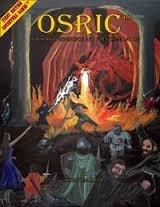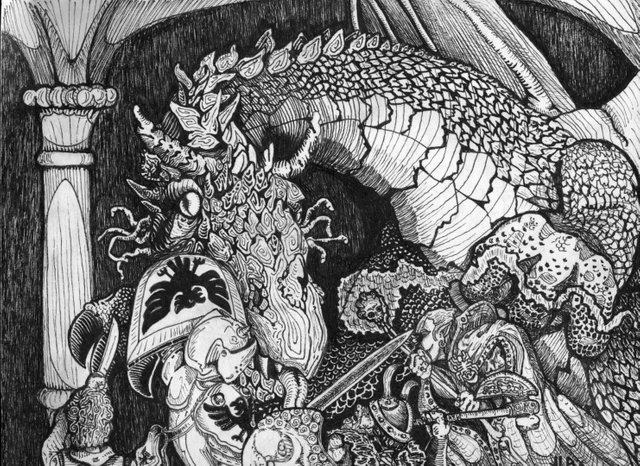With the advent of the Netflix show Stranger Things, there has been a lot of buzz in geek circles about old school Dungeons and Dragons. A bit earlier this year, OSRIC (Old School Reference Index and Compilation) reached its 10 year mark. Definitely a good time for old school gaming. And with guys like Stephen Colbert and Anderson Cooper talking about their love of old school gaming, it's probably worthwhile to explain it a little bit, at least from a somewhat inside perspective.
So, I've been playing D&D since around 1980 or so. I'll post in another later post about all of that, but for now, I wanted to touch on the so called OSR from an OSRIC perspective. What follows is an overview of my foray into the world of being a small press fantasy roleplaying artist.

OSR - there seems to be a bit of contention around what the acronym stands for. When I first encountered it, it was expressed as Old School Renaissance. Others say it is Old School Revival or Old School Rules. And there are probably several others. I tend to be partial to the Renaissance version myself, but whatever blows your hair back aye? At any rate, in the early 2000's, with the advent of 3rd edition Dungeons and Dragons form Wizards of the Coast, I started to take an interest in Role Playing again. In the early 1990's I drifted away. I didn't tend to like the direction of 2e at the time (I've since come to grow fond of 2e, but again, that's for another time). One of the more striking aspects of 3e, besides the art and revamped rules, was the Open Gaming License (OGL). Ryan Dancey, in a rather bold move opened the rule set to third party publishers by providing a mechanism for these publishers to legally release 3e D&D compatible gaming material. Good stuff!
While I liked (and still do like) 3e, it didn't quite have the charm - and more importantly the feel of 1e AD&D. I looked around the web for like minded gamers and eventually came across Dragonsfoot.org. Great site for old school gamers with heaps of player generated content. At the time, there was a lot of discussion about the OGL ONLY being useful to publish 3e/d20 compatible material. The rulesets between 1e and 3e are sufficiently different to not be directly portable. Sure, outfits like Necromancer Games and Troll Lord Games had been releasing d20 compatible material that hearkened back to 1e (thus the tag line 3e rules, 1e feel). Still, many (to include myself) wanted new gaming material, that was professionally produced using the old rule set. It was believed that there was no easy legal path to do so. However, enter Matthew Finch, a dedicated old school gamer that decided to go for it and use the OGL to create a framework for the old school rules to be legally adapted and able to be used by publishers to release new gaming material. This tended to lead to heated debates on the forums at the time. A group of dedicated 1e gamers over at the Knights and Knaves Alehouse forum supported Matt and his idea and OSRIC 1.0 was put out. Initially it wasn't much. It was never really meant to be at first. OSRIC (Old School Reference Index and Compilation) was simply meant to be a reference document for publishers to be able to release new material. And at first, there were few takers. OSRIC was thought to be doomed by may of the rpg pundits that were sure that WotC would rain legal fire down on anyone audacious enough to pursue that path. It was a bit of an uncertain time.
Enter Stuart Marshall, a UK native and gaming enthusiast. He saw the possibility in what Matt had started and decided to take it a step further. OSRIC 2.0 would be a full fledged rule set that was useful not only to publishers, but as a rule set that gamers could bring to the table and use with or in lieu of their 1e books. Stuart put out the call on the message boards for participants. At the time, I had done a little art for some small press 3e companies and was eager to do some more work. This looked like a good opportunity so I answered the call as an illustrator. With this image, my journey began:

A bit crude, but then again, it was a start. And for this post, it's where we'll leave off. Well, I do want to point out that OSRIC is FREELY available to download in PDF. Go check it out here: http://www.knights-n-knaves.com/osric/download.html. More art and more of the journey in subsequent posts!
I love dungeons and dragons and look forward to more of your posts!
Downvoting a post can decrease pending rewards and make it less visible. Common reasons:
Submit
Thank you! I love it too. I'm glad that I also get to contribute back (albeit in a small way).
Downvoting a post can decrease pending rewards and make it less visible. Common reasons:
Submit
Was this done with pen or pencil? It has the vibe of something you'd see in the pages of an old manuscript.
Just remembered, it seems like you told me before that you used to do old cave art style paintings. Or is that just a pigment of my fragmentation?
Downvoting a post can decrease pending rewards and make it less visible. Common reasons:
Submit
The illustration was actually done with Micron pens. I tend to use India ink and brushes these days but still use a pen on occasion. Oh, I did do cave art style paintings. I'm looking at doing something similar again.
Downvoting a post can decrease pending rewards and make it less visible. Common reasons:
Submit